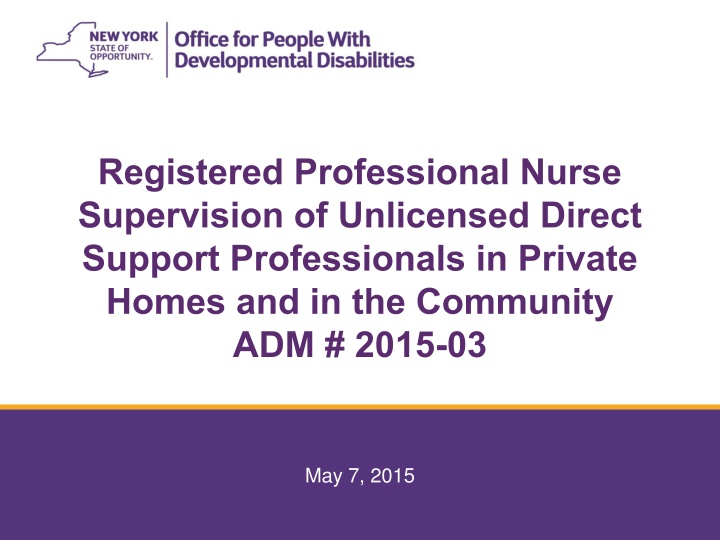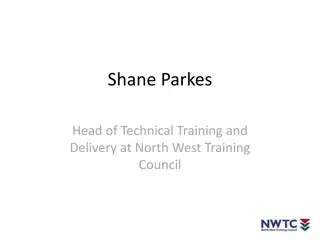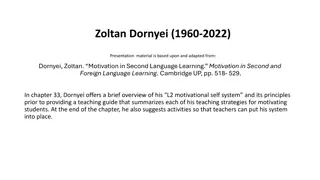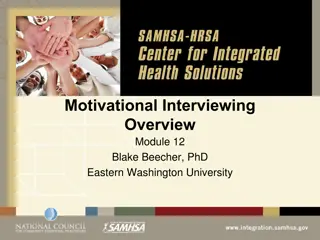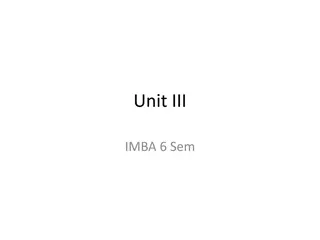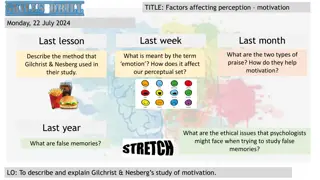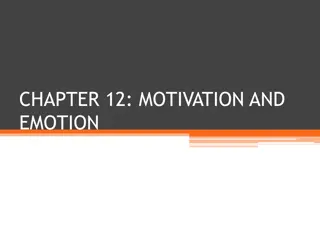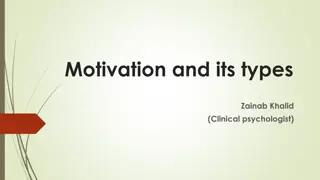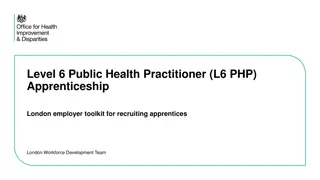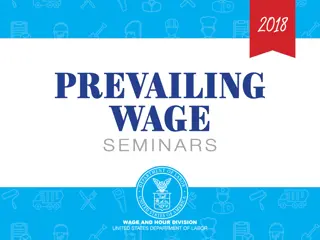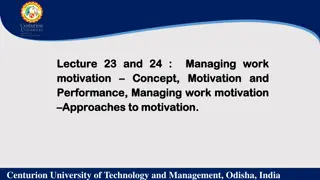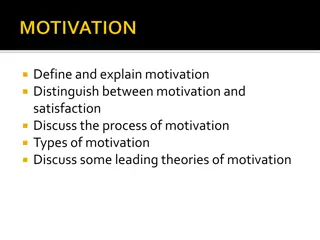Influence of Learning Environment on Apprentices' Motivation
Facets of the learning environment play a crucial role in influencing apprentices' motivation and learning success. This study explores the importance of intrinsic motivation, the German dual system of Vocational Education and Training, and the significance of creating a conducive working/learning environment for apprentices. Findings suggest that intrinsic motivation is essential for successful learning, with the learning environment serving as a mediator between the learner's personality and competence development.
Download Presentation

Please find below an Image/Link to download the presentation.
The content on the website is provided AS IS for your information and personal use only. It may not be sold, licensed, or shared on other websites without obtaining consent from the author.If you encounter any issues during the download, it is possible that the publisher has removed the file from their server.
You are allowed to download the files provided on this website for personal or commercial use, subject to the condition that they are used lawfully. All files are the property of their respective owners.
The content on the website is provided AS IS for your information and personal use only. It may not be sold, licensed, or shared on other websites without obtaining consent from the author.
E N D
Presentation Transcript
3/1/2025 1 Registered Professional Nurse Supervision of Unlicensed Direct Support Professionals in Private Homes and in the Community ADM # 2015-03 May 7, 2015
3/1/2025 2 Background Multiple OPWDD stakeholders worked diligently with NYS Education Department (NYSED) and the State Board of Nursing (SBON) to develop the new ADM allowing the delegation of certain nursing tasks by an RN to a DSP providing certified services in NON-certified sites
3/1/2025 3 Outcome OPWDD and NYSED signed the Memorandum of Understanding (MOU) and Administrative Memorandum (ADM) effective April 1, 2015. This ADM is NOT to be implemented by any agency until such time that a plan of implementation is communicated to the field by OPWDD. The ADM 2003-01 remains in effect allowing the delegation of certain nursing tasks by an RN to a DSP in OPWDD certified sites.
3/1/2025 4 Overview ADM # 2003-01 Registered nurses supervision of unlicensed direct care staff in residential facilities CERTIFIED by the Office of Mental Retardation and Developmental Disabilities (now OPWDD) ADM # 2015-03 Registered professional nurse supervision of unlicensed direct support professionals in programs approved by the Office for People with Developmental Disabilities (in certain NON-certified sites).
3/1/2025 5 Purpose ADM 2015-03 has been developed pursuant to New York State Education Law 6908(1) (a) (v), to: (1) identify the programs authorized to utilize direct support professionals to provide certain nursing tasks under the supervision of a registered professional nurse; and (2) define criteria for providing high quality, person centered, nursing services to individuals with intellectual/developmental disabilities, who participate in such programs.
3/1/2025 6 Applicability This ADM applies to providers of Home and Community Based Services (HCBS) approved or certified by OPWDD pursuant to Mental Hygiene Law section 16.03(a)(4). This ADM applies to services provided by registered professional nurses and direct support professionals to individuals with intellectual/developmental disabilities in their private homes and while accompanying the individuals in the community, in settings not certified by OPWDD.
3/1/2025 7 Comparison between ADM s Definitions in ADM 2015-03 Improved/clarified definitions in ADM 2015-03 Individual Approved provider Registered professional nurse Licensed practical nurse Direct support professional Habilitation and respite care services Nursing tasks
3/1/2025 8 Comparison between ADM s Nursing Tasks in ADM 2015-03 For the purposes of this ADM, nursing tasks are tasks that may be delegated in writing by an RN to a DSP, and may include the following: o bladder catheterization care (except for the insertion or removal or indwelling catheters or procedures requiring sterile technique); o non-sterile dressing changes; o glucose monitoring tests using medical devices approved by the FDA for over-the-counter use, if used for a single individual; o respiratory care tasks, such as basic spirometry, oxygen administration and nebulizer treatments; o permanent gastrostomy or jejunostomy tube feedings; o colostomy care that does not require sterile technique. o basic medication administration tasks (i.e., topical, eye/ear/nose drops, enemas, suppositories, and some routinely administered oral medications); and o subcutaneous injections of diabetes-related medications and emergency injections (including, but not limited to, epinephrine, narcan, glucagon);
3/1/2025 9 Comparison between ADM s Nursing Tasks in ADM 2015-03 For the purpose of this ADM, the following activities and services shall not be delegated to a DSP and shall not be performed by a DSP: o any activity that is outside the scope of practice of a licensed practical nurse; o the administration of medications or fluids parenterally (except for subcutaneous injections of diabetes-related medications or emergency injections (including but not limited to epinephrine, narcan, glucagon, as described above); o any services that are inconsistent with care ordered or prescribed by a physician, physician assistant, nurse practitioner, dentist, or podiatrist; o the administration of controlled substances, except for federal Schedule IV and Schedule V controlled substances prescribed to treat seizure disorders or another developmental disability; o any services requiring sterile technique; and, o any nursing care that requires professional nursing judgment, including the assessment of the medication needs of an individual served by OPWDD.
3/1/2025 10 Comparison between ADM s Delegation of Nursing Tasks in ADM 2015-03 Initial Assessment: With respect to each new individual served by an approved provider, the approved provider, in collaboration with an RN employed by or under contract with the approved provider, shall review the individual s nursing needs, if any. If the RN determines that the individual requires nursing services, the RN shall complete a comprehensive assessment of the individual to determine whether nursing tasks, in whole or in part, could be delegated to DSPs with adequate training and nursing supervision. Delegation Decisions: The same as ADM 2003-01
3/1/2025 11 Comparison between ADM s Documenting Delegation Decisions in ADM 2015-03 The RN shall develop an individualized plan of nursing services based on the comprehensive nursing assessment of the individual, which identifies the nursing services to be provided to the individual, including delegated nursing tasks. An RN who delegates the performance of nursing tasks shall note in the individualized plan of nursing services a description of the nursing task, the name of the DSP(s) to whom the task is delegated, the date of the delegation, the RNs who will initially be assigned to supervise the DSP(s) and the RN s signature. The RN may include specific recommendations relating to the RN supervision of the delegated tasks. An RN shall promptly document in the individualized plan of nursing services any changes or termination of a delegation along with the RN s signature.
3/1/2025 12 Comparison of ADM s Requirements of ADM 2015-03 are essentially the same as the requirements of ADM 2003-01 for the following: RN Supervision of DSP(s) Training Availability of RN to DSP(s) Plan of Nursing Services Differences are in the following areas: Frequency of visits by RN s ADM 2003-01: once per week ADM 2015-03: once per month Clinical Performance Evaluations ADM 2003-01: include, but not limited to, medication administration ADM 2015-03: include, but not limited to, annually o medication administration o insulin administration o tube feeding
3/1/2025 13 Comparison of ADM s Staffing Ratios RN to Individuals ADM 2003-01 (1:50) ADM 2015-03 (1:35)
3/1/2025 14 Conclusion Training needs to remain the same for RN s, LPN s, AMAP s and DSP s who will be working in either certified or non- certified sites AMAP curriculum changes training points to be added regarding restriction of controlled substances administered to allow federal class IV and V used to treat seizures and other developmental disabilities AMAP curriculum changes- training module to be added to address medication storage, medication administration documentation, and meds on the go for non-certified sites Agencies must develop policy and procedures related to requirements of the ADM before implementation Highly recommend that agencies pilot this ADM on smaller scale prior to full implementation
3/1/2025 15 Conclusion We need to consider that we will be providing services in an individual s home not a home operated by OPWDD or a voluntary agencies home where we don t have a level of jurisdiction This ADM also requires input from the individual or their representatives regarding the rendering of services by the DSP Remember there is not a lot of difference compared to what we currently do, rather it is a change in where we can provide services
